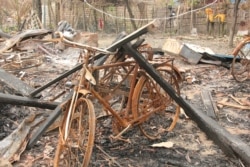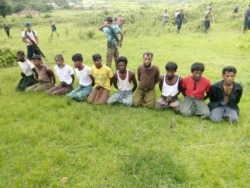They show little to no emotion. Their answers may have been rehearsed, but what they say is explosive. Two former foot soldiers, now deserters, from Myanmar’s army say in video-recorded confessions that they participated in atrocity crimes including mass murder and the destruction of entire villages under the orders of senior officers.
“Shoot all you see and all you hear,” one former soldier, Private Myo Win Tun, says in a video about the order from a colonel before members of his battalion killed 30 Rohingya Muslims and buried them in a mass grave.
The other deserter, from a different battalion, Private Zaw Naing Tun, says that under the orders of a lieutenant colonel, he and other soldiers killed about 80 people, including children, as well as elderly men and women.
The former soldiers provide details about some of the killings, and they also identify the battalions involved, naming senior officers, villages burned and the locations of mass graves they helped fill with their victims’ bodies.
The confessions were recorded by the Arakan Army, an insurgent militia that is fighting Myanmar’s army in the country’s Rakhine state. The New York Times and Canadian Broadcasting Corporation were first to report on the videos; VOA has since viewed them but has not been able to verify the circumstances under which they were recorded.
Fortify Rights, a human rights group that has been investigating atrocity crimes allegedly committed by the Myanmar army, has analyzed the videos and says the former soldiers’ statements are credible.
“These two individuals were operational in two separate areas in northern Rakhine state around the same time and they were receiving similar orders essentially to commit genocide and that indicates coordination at the higher levels of the Myanmar military,” said Matthew Smith, chief executive officer of Fortify Rights. “To hear it directly from soldiers who were receiving the orders is highly significant.”
Accusations against military
The statements from the two soldiers add weight to accounts that have been given by numerous victims and investigators since August 2017. That’s when the country’s military launched a brutal crackdown in response to attacks on Myanmar security outposts by Rohingya militants.
United Nations investigators reported that at least 10,000 Rohingya were likely killed and about 200 settlements were destroyed. The campaign drove more than 700,000 Rohingya Muslims into neighboring Bangladesh, by U.N. count. They now live in squalid refugee camps and depend on humanitarian aid to survive.
The refugees brought with them harrowing accounts of gang-rapes and victims being locked into homes that were set on fire. U.N. investigators say the military operation against the stateless Rohingya minority had genocidal intent.
Myanmar’s government has continuously dismissed the accusations. Testifying at the International Court of Justice last December, State Counselor Aung San Suu Kyi, the country’s highest civilian leader, denied that there was a state-sponsored campaign to destroy the Rohingya.
The military says a small number of rogue soldiers have committed crimes.
Responding to the videos, Myanmar military spokesman Major General Zaw Min Tun called the Arakan Army, the insurgent group that recorded the videos, a terrorist organization and said the former soldiers may have been coerced into giving their statements.
He also said Myanmar has its own mechanism to investigate alleged human rights violations. But international human rights groups have long accused the military of whitewashing crimes and lightly punishing lower-level perpetrators.
“The military has attempted to show that it’s somehow activating its own justice mechanisms,” said Matthew Smith of Fortify Rights. “It’s very clear these lack credibility.”
ICC investigation
The two former soldiers are now widely reported to be in The Hague, Netherlands, the home of the International Criminal Court, where they could be charged with participating in atrocity crimes and also provide testimony in court proceedings while under witness protection.
The ICC is investigating the forced deportation of Rohingya to Bangladesh as a crime against humanity, as well as persecution and other inhumane acts. The ICC typically prosecutes senior-level people accused of egregious crimes including genocide and crimes against humanity. It ordinarily doesn’t prosecute low-ranking soldiers, which would include the two deserters.
Two well-placed sources tell VOA the ICC arranged for the former soldiers to be brought to The Hague after ICC investigators interviewed them in Bangladesh, although the ICC has not confirmed this.
Fortify Rights says the two former soldiers arrived at the Bangladesh border in mid-August asking Bangladesh authorities for protection. Bangladesh later informed the ICC.
When talking about his battalion’s attacks on Rohingya civilians in one village, Private Myo Win Tun said in the video: “We indiscriminately shot at all.” He added that a colonel ordered the troops “to exterminate all kalar,” which is a Burmese-language slur used for foreigners of South Asian origin. Private Myo Win Tun also admits to raping one woman.
Private Zaw Naing Tun says in the video that at one point he, along with other members of his battalion, captured 10 Muslims who were suspected of having ties to a militant group. Private Zaw Naing Tun said they tied up and killed all 10 of them.
“This is a real crack in the ranks,” said Phil Robertson of Human Rights Watch. “It creates a dynamic where there may be more people coming out with these kind of stories. There may be more defectors who are leaving Myanmar to give testimony.”
Robertson added the two soldiers could play a significant role in investigations by the ICC and the International Court of Justice, where Myanmar faces charges of genocide.
“As witnesses they have a great deal of potential to really further clarify the environment in which the Myanmar military operates,” Robertson said. “It is a rapacious scorched-earth type of military that has a long record of abusing civilians.”







